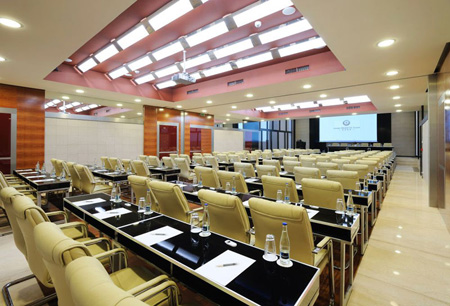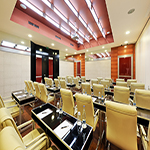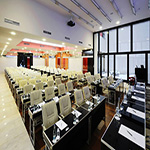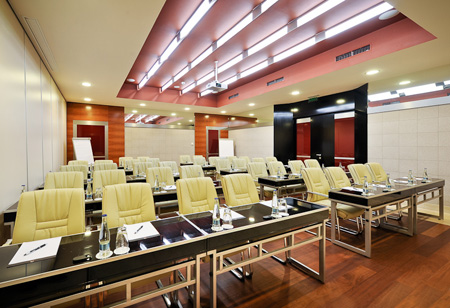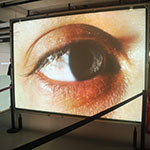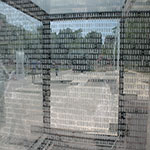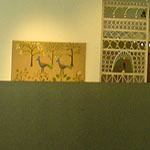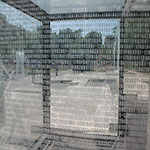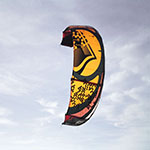Grand Majestic Plaza Hotel
Truhlářská 16, 110 00 Prague 1Conference program
- March 15, 2013
- 09:00 - 09:30Registration
- 09:30 - 10:00Welcome and Opening Remarks
- 10:00 - 11:00Opening Workshop: The State of Europe
- 11:00 - 11:30Coffee Brake and Snacks
- 11:30 - 13:00Panel 1 - The European Way: Identitarian Representations of Europe in Visual Arts, Performing Arts and Literature
- 13:30 - 14:30Lunch at Grand Majestic Plaza Restaurant
- 14:30 - 16:30Panel 2 - Europe's External Perceptions and Influence: The Evaluation of the EU as a Normative Power
- 16:30 - 17:00Coffee Brake and Snacks
- 17:00 - 19:00Panel 3 - The European Union: From a Regulatory Body to a Post-National Cosmopolitan Order
- 19:00 - 19:45Welcome Drink and Snack
- 19:45 - 21:00Optional Social Dinner at a Czech Cuisine Restaurant
- March 16, 2013
- 09:00 - 11:00Panel 4 - Europe and Media Environments
- 11:00 - 11:30Coffee Brake and Snacks
- 11:30 - 13:30Panel 5 - EUrope and Identities
- 13:30 - 15:00Lunch at Grand Majestic Plaza Restaurant
- 15:00 - 17:00Panel 6 - European Politics and Economic Development: Opportunities and Distortions
- 17:00 - 17:30Coffee Brake and Snacks
- 17:30 - 19:30Panel 7 - Colonial Metaphors through Sequential Art: Domination, Exotic Places and Alterity in European Comic Books
- 19:30 - 20:30Concluding Remarks and Discussions
- March 15, 2013
Europe Inside-Out: Europe and Europeanness Exposed to Plural Observers

- Conference Description
- Panels
- Participant’s Profile
- Registration and Fee
- Social Activities and Publication
- Important Dates
- Venue and Directions
- Conference Program
- Panel 1
- Panel 2
- Panel 3
- Panel 4
- Panel 5
- Panel 6
- Panel 7
The Third Euroacademia Global Conference
Europe Inside-Out: Europe and Europeaness Exposed to Plural Observers
15-16 March 2013, Prague, Czech Republic
Grand Majestic Plaza Hotel
Europe became in the 20th century an elaborated yet contested notion as a particular field of European studies emerged and extensive and diverse research was directed recently towards an intensified search for what Europe is about. The creation of the European Union made things even more specialized and increased the stake of methodological rigor as more and more Europeans are affected by the decisions taken in Brussels. The number, diversity and quality of research projects focused on European issues is unprecedented, yet, as it is usually the case with specialization it gradually led to discursive communities that rarely meet and debate their approaches in open floors together with peers from other continents, academic traditions and cultures. It is the aim of this conference to build a bridge among specialists from different regions, academic traditions and cultures that share a common interest in studying and addressing Europe as a reflexive concern.
The Third Global Conference ‘Europe Inside-Out: Europe and Europeaness Exposed to Plural Observers’ aims exactly to refresh a broader approach and understanding of Europe by enlarging the platform of regular conferences and workshops for a wider arena of participants and disciplinary backgrounds in order to put on stage a worldwide monadology for such concerns. The conference aims to enable critical alternatives to the disciplinary orthodoxy by creating a framework for interaction and dissemination of diversity that has to become once more a European trademark. The conference also aims to become a constructive confrontational space for alternative methodologies, provocative puzzles, inter, multi and trans-disciplinary understandings for wider and also for thinner specialized issues of concern on or about Europe of today. In a way, such a conference aims to become a moment of return to the European specificity of critical self-understanding through dialogue and debate with all the discursive or narrative traditions that directly or indirectly constitute its self.
What is Europe and its place in the world? Is there something particular that sedimented in time and through a controversial history a European way? How does Europe see itself and how do others see it? Is Europe inclusive or club-based exclusive? Is Europe becoming a normative power or just envisages itself as one? Is the European multiculturalism a fact or an ideal? Is the European Union a reflection of Europe or an appropriation of it? These are just few questions out of an enormous space for inquiry that are to be addressed and confronted within the topic of the conference.
The Euroacademia Conference ‘Europe Inside-Out: Europe and Europeaness Exposed to Plural Observers’ became a regular event to take place in every year in a different European location. After two successful editions – the first one in Vienna and the second one in Paris – Euroacademia moves the stage of reflection, sharing, dialogue, debate and research dissemination on Europe to Prague, Czach Republic – in the lands of Jan Hus, Franz Kafka, Jan Palach, the Prague Spring, and of course Milan Kundera. Join us!
The Third Euroacademia Global Conference – Europe Inside-Out. Europe and Europeaness Exposed to Plural Observers
is organized yet by no means restricted to the following orientative panels:
- Europe as a would be world power
- Europe as a would be world power
- Europe and its internal and external others/outsiders
- Europe and identities
- Fortress Europe?
- EU and appropriations of Europe
- Europe and the Mediterranean assortment
- Europe and the inclusive/exclusive nexus
- Europe and the US
- Europe and anti-Americanism
- Europe as seen from its Eastern neighbors
- Europe as viewed from far away: narratives of the Europeans outside
- Europe as viewed from Asia
- Europe and Africa
- Non-familiar faces of Europe
- Knowing Europe in a different way: from Latin America to Australia
- Europe and the EU as a normative power
- EU regulatory practices in context
- The multiple faces of Europeanization as a process
- Europe and the persistence of the East-West Slope
- Europe and crises
- Europe and cosmopolitanism
- Europe and the post-national orders
- Europe in the World
- European narratives of the past: the mnemonic/amnesic nexuses
- Europeanization versus globalization
- Europe and conflict resolution
- European social models: welfare states and neoliberal suspicions
- Europe and innovation
- The politicization of Europe
- Europe and cultural diplomacy
- Literature and literary ways of portraying Europe
- Europe and media environments
Participant’s Profile
The conference is addressed to academics, researchers and professionals with a particular interest in Europe, Europe related and European Union topics from all parts of the world. As the nature of the conference is intended to be multidisciplinary in nature different academic backgrounds are welcomed. Cultural approaches, political studies, critical studies and artistic/literary contributions to the better understanding of Europe in its past present and future dimensions are welcomed.
Post-graduate students, doctoral candidates and young researchers are welcomed to submit an abstract. Representatives of INGOs, NGOs, Think Tanks and activists willing to present their work with impact on or influenced by specific understandings of Europe and/or the European Union are welcomed as well to submit the abstract of their contribution.
Abstracts will be reviewed and the participants are selected based on the proven quality of the abstract. The submitted paper for the conference proceedings is expected to be in accordance with the lines provided in the submitted abstract.
Registration Is Now Closed
The participation fee includes:
- the registration fee,
- participant’s package with all the materials for the conference
- a copy of the electronic volume
- access to Euroacademia discussion group and newsletters
- discounted rates for participation in the future Euroacademia conferences
- daily welcome coffee with snacks and conference drinks (water/sodas)
- coffee brakes with snacks for all the duration of the conference
- sparkling wine reception with snacks on 15th of March 2013
- a 4 course lunch on 15th of March 2013 at the 4* Grand Majestic Plaza Restaurant
- a 4 course lunch on 16th of March 2013 at the 4* Grand Majestic Plaza Restaurant
- preferential discounted rates for room reservations at Grand Majestic Plaza Hotel
- certificate of attendance
- access to the optional social program.
Please be aware that the final confirmation of attendance will be considered upon payment of the participation fee until the 25th of February 2013 in the Euroacademia account:
Euroacademia
Credit Mutuel
IBAN: FR7610278060470002073210155
BIC: CMCIFR2A
Branch PARIS 17 ETOILE – 30 AVENUE NIEL 75017 PARIS FRANCE
The participation fee can be paid only through bank transfer. A confirmation of receipt will be sent to you by e-mail and the original invoice will be delivered to you on site at the conference.
Unfortunately, Euroacademia has no available funds for covering transport and accommodation to/in Prague. Participants are responsible for finding funding to cover transportation and accommodation costs during the whole period of the conference. Official letters can be sent by Euroacademia to the financing institution to confirm the selection and participation in the conference upon request.
A specific spot in the conference program will be dedicated to social networking and therefore all the participants interested in setting or developing further cooperation agendas and prospects with other participants will have time to present and/or promote their project and express calls for cooperation.
A specific setting (Social Corner) for promotional materials connected with the topic of the conference will be reserved for the use of the participants. Books authored or edited by the participants can be exhibited and promoted during the whole period of the conference and can also be presented within the conference package based on prior arrangements.
An optional dinner and a social event will be organized for the second evening of the conference in a typical Czech cuisine Restaurant as optional program for the willing participants. The social dinner will be held based on participant’s confirmation and it costs around 30 Euro to be covered by participants.
Publication:
Selected papers will be published in an electronic volume with ISBN after the confirmation of the authors and a double peer-review process based on an agreed publication schedule. All the papers selected for publication should be original and must have not been priory published elsewhere. All participants to the conference will receive a copy of the volume.
Specific selected papers will be also published in CEJISS (Central European Journal of International & Security Studies)
About CEJISS
Formally launched in January 2007, CEJISS is designed as a double-destination scholarly bridge. The first bridge was constructed with Central Europe (Czech Republic, Hungary, Poland and Slovakia) in mind, focusing on increasing the audience for Central European scholars. In this regard, CEJISS is making a substantial impact as each issue attracts attention in some 45,000 people in nearly 160 countries. However, CEJISS is not Central European centric and invites scholars from around the world to contribute. This has meant that just as Central European scholars now have an easier time gaining a footing outside of the region, so international scholars also have an easier time getting in and making an impact here. With a mere two decades separating our times from the ‘darker’ Cold War years, CEJISS aims to contribute English language perspectives to the peoples of Central Europe and give the latter the amplification their research deserves.
| Important Dates | |
|---|---|
| 15 November 2012 | Deadline for Submitting Panel Proposals |
| 15 February 2013 (Extended Deadline) | 300 words abstracts and details of affiliation |
| 17 February 2013 | Notification of acceptance |
| 20 February 2013 | Sending the participation form |
| 25 February 2013 | Payment of the conference fee |
| 25 February 2013 | Sending the draft paper to be uploaded on the web site of the conference |
| 1st of March 2013 | Publication of the conference program and uploading the draft papers on the website |
| 15 March 2013 | The conference commences at 9.30 AM |
The conference will take place in the conference premises of the exclusive 4 stars deluxe design Grand Majestic Plaza Hotel, centrally located in the heart of Prague, easily accessible from the historic center and within a walking distance from all the major tourist attractions: just few steps away from the famous Municipal House, Gothic Powder Gate, significant Republic Square and the most attractive shopping centre Palladium.
Hotel Grand Majestic Plaza, Prague
Truhlářská 16, 110 00 Prague 1
Czech Republic
Tel.: +420 211 159 100
Fax: +420 211 159 159
E-mail: [email protected]
Prague is a wonderful European city with a very rich history and a vivid passionate intellectual life; a place full of various and inspiring cultural events, sightseeing opportunities, great food, exquisite architecture and of course the city that brings easily to your mind Jan Hus, Franz Kafka, Jan Palach, the Prague Spring, and Milan Kundera. After all these, the unique atmosphere gives anyone a chance for personal memories and reveries. Prague is a city of beautiful moments!
See full information about the conference Location & Map:
HERE
Conference participants are responsible for arranging the accommodation and travel. However, discounted rates for some specific hotels can be arranged by organizers and announced to selected participants upon request.
The European Way: Identitarian Representations of Europe in Visual Arts, Performing Arts and Literature
- Europe in Visual Representations of Migration: ‘WESTERN UNION: Small Boats’ by Isaac JulienThe (post-)colonial violence by which the “entangled histories“ between Europe and Non-European societies have been shaped are evoked. I argue, however, that the allegoric translation by which this happens perpetuates hegemonic notions of gender and race that are traditionally fundamental for the construction of the European “Self“ and the Non-European “Other“.Katrin Hunsicker, Carl von Ossietzky University, Oldenburg, Germany
- The Quest for Identity: Germany and Its Art In the Cold War-PeriodAfter the collapse of the Soviet Union the ideas of globalization grew steadily, in politics and equally in the art scene. But until now the East-West-Gap in the Arts exists. The examination of famous German artists in comparison to the ones from Eastern Europe will make it obvious.Elena Korowin , Karlsruhe University for Arts and Design, Germany
- The Venice Biennale as a System of (Inter)National (Re)Presentation: The Polish PavilionThe fear of losing the national identity makes conservative movements active. Which positions take artists and how reacts the public opinion to their art? Which values the Polish state is supporting today by the culture politic? For the 54th Biennale, the polish state organizers chose as their “national” representation an Israeli artist, Yael Bartana.Margareta Scherf, Braunschweig Universtity of Arts, Germany
Europe’s External Perceptions and Influence: The Evaluation of the EU as a Normative Power
- EU-Australia Relationship: On the Swiss TrackWe will explore in this paper how the European Union is able to foster tighter relations with an external partner through practical and efficient cooperation such as the Schengen Convention. In the first part, the case of Switzerland will demonstrate the importance of this convergence of interests on security cooperation, border control domain but also on freedom of movement. The second part will bring the light on the Schengen Convention and the underlying rules and assumptions behind it in an attempt to explain its success.Adel Dellagi, Triangle Research Unit, Institut d’Etudes Politiques de Lyon, France
- Transitions in Europe’s Southern Neighborhoods: Among High Hopes and Rising WorriesThe present paper analyses the European response the transitions in Maghreb and Machreq, the tools used and undertaken policies, as well as the challenges put forward by the transition process in post-revolution Arab countries, with special regard to the significance of civil society as a tool in the process of democratization.Radoslaw Stanczewski, University of Social Sciences and Humanities in Warsaw, Poland
- Turkey in Which EU? Turkish Discourse on EU Accession and ‘Ideal’ Views of the EUThis paper examines Turkish political discourse on the EU in order to better understand how the EU is perceived among the Turkish political elite, particularly the governing Justice and Development Party. This paper uses an analytical approach developed by Sjursen (2002, 2006, 2008) according to which arguments used by political elites for/against enlargement can help shed light on perceptions of the EU.Catherine MacMillan, Yeditepe University, Istanbul, Turkey
- Turkish Perceptions of the Euro-Zone Crisis: On Turkey’s Changing Perceptions on Europe and the EUBeing a ‘historical Other’ in proximity of the EU, with a particular constitutive role in the formation of a collective European identity, Turkey’s changing perceptions of the EU provide us a valuable insight into the evolving image of the EU from the outside and dialogical interactions between the Self and the Other. Consequently, this paper investigates the Turkish perceptions of the EU crisis in an attempt to evaluate the EU’s claim to be a post-national normative power.Beyza Ç. Tekin, Galatasaray University, Department of International Relations, Istanbul, Turkey
- Generals, Christians and Turkey’s EuropeanizationThis paper discusses how the process of political change in Turkey, rather than just slowing down, has actually shifted from a phase of legislation and constitutional amendments to a phase of raw political struggle over the meaning of these earlier reforms.Ekrem Eddy Güzeldere, European Stability Initiative, Turkey
The European Union: From a Regulatory Body to a Post-National Cosmopolitan Order
- From Dual to Collaborative Federalism – A Constructivist Reading of Intergovernmental Policy Coordination in Canada and the European UnionFocusing on different aspects of the creation of economic union in Canada (internal trade) and the EU (economic governance), this comparative study argues that the ‘deliberative capacities’ in the system influences the emergence of intergovernmental coordination, and provides with a complementary development path to legal coordination. The paper sums up the findings based on a number of interviews conducted with government officials and public servants in Canada and the EU.Robert I. Csehi, Central European University, Budapest, Hungary
- Chaotic’ Institutionalization and European Citizenship: Examining the Post-national Cosmopolitan Order in the European UnionEmotional identification of EU citizens with the Union is a critical deficiency but it was not created by a ‘deficit of democracy’. The ‘deficit of a European awareness’ demonstrated by many politicians is a failure. On the other hand, I would ‘perversely’ interpret the popular resistance to the austerity measures as a sign of emerging European awareness.Bruno Surdel, Department of Political Science, Zirve University, Gaziantep, Turkey
- The EU as a Component Part of the Global Economy or Sovereign Economic EntityShould the EU maximize its BDP, or BDP of individual states should be maximized? The same questions are pertinent for the level of employment, social justice… Does the EU become a region of a unified global state? These are questions to be answered in the interest of citizens of the EU ASAP. These are questions we try to tackle within the paper.Dragoljub Stojanov, University of Rijeka, Croatia
- Cross-border Credit in Europe: Hedging Information RiskAdverse selection and moral hazard are serious problems confronting any credit market. Credit registers mitigate these two problems by acting as a borrower’s disciplinary mechanism. However, for multinational markets, these problems become more intractable. The absence of cross-border consumer credit reporting facilities hinders the ability for lenders to judiciously extend credit to foreigners.Wei Dong, HSBC Business School, Peking University, China
- The European Union: State-Building or Not?The conclusion of this paper is that the EU project can be considered an exercise in state-building. However, the emergence of the EU as a national state is likely to be a long way off.Andrew Stark, University of Pittsburgh, USA
Europe and Media Environments
- The European Economic Crisis: Revitalizing National Identity Through Political Cartoons and Imagesthe subject of this research questions whether the economic polarization between the PIGS and European northern countries (such as Germany, France, Britain) has also triggered, a cultural polarization and the detachment of Europe into ‘two Europes’, consisting of poor and rich.Georgios Tsarsitalidis, Uppsala University, Sweden
- Media Regulation in Montenegro in the EU Association ProcessIn this work we will look at the law makers, then at the regulators and the media, as well as end users. We will also talk about law implementation, importance of their implementation on different levels. While we especially emphasize the importance of these laws to preserve press freedom and contribution to EU accession. We will explore how the Montenegrin media legislation aligned with EU.Dragic Rabrenovic, Director of Radio Bijelo Polje, Montenegro
- Montenegrin Media Reporting on the EU Accession ProcessThis paper presents the research results related to the reporting of the media in Montenegro's EU accession process, with special emphasis on electronic media. We analyzed the four radio stations and four television stations. Categories that were investigated, among others, are topics about Europe, EU and Europeanization in the main or the secondary focus.Andrijana Rabrenovic, Faculty of Political Science, Podgorica, University of Montenegro
- Media Reporting in Serbia on the European UnionThe aim of this paper is to show how much and in which way the electronic and print media in Serbia report on European Union. Considering the fact that Serbia is a candidate country for EU membership, the main hypothesis is that there is a big interest for ‘European topics’ in the media.Dejan Pralica, Faculty of Philosophy, University of Novi Sad, SerbiaSmiljana Milinkov, Faculty of Philosophy, University of Novi Sad, Serbia
EUrope and Identities
- Transforming Identities: Defining Corporate Social Responsibility in the European UnionThis paper sets out to examine the European Commission’s policy for promoting CSR in the EU between 2001 and 2011, asking the question of what led to this transformation in its definition. First, the various problems that gave birth to the idea of CSR are laid out, along with a discussion of how it has come to be promoted as national or European policy.Omri Preiss, Utrecht University, The Netherlands
- The European Identity as A Corporate Type of IdentityThis paper looks at the potential benefits of extrapolating analytic elements from the neo-institutionalist study of corporate identities to a better understanding of the functional concept of European identity as appropriated by the EU.Emanuel Crudu, IMT Institute for Advanced Studies, Italy
- Constructing the Other/s: Discourses on Europe and Identity in ‘First’ and ‘Other’ SerbiaThe questions this paper specifically addresses is what it means to be a ‘Serb’ and/or ‘European’; or to be labelled as ‘anti-Serbian’; and how the concept of ‘traitor’ or a ‘patriot’ is constructed within the ‘First’ and ‘Other’ Serbia discourses on identity. In general terms, close analysis of the quality press shows how the politics of othering makes the distinction between US and THEM and further contributes to the contestation of Serbian political identities.Ana Omaljev, University of Reading, UK
- Eastern Europe/NIS as European States: To the Question of Constructing IdentityNowadays, the question of identity and self-perception of NIS is determinative for their foreign policy. For example, the European integration of Ukraine. For the most Ukrainians their country is a part of Europe, but in political context and in the sphere of human rights and democratic governance there is a strong influence of our past (soviet, as part of Russian Empire etc.).Olena Kovtun, Kyiv National Taras Scevchenko University, Ukraine
European Politics and Economic Development: Opportunities and Distortions
- Energy and Environmental Challenges. The EU Approach and the Case of the Mediterranean Solar PlanThis research paper proposal has three main aims 1. To offer a brief summary of the EU energy policy evolution, with emphasis at the 20-20-20 objectives (‘An Energy Policy for Europe ‘ COM 2007,1) and the promotion of RWE in the member - states energy mix ; 2. To identify the place of RWE promotion in the EU’s external energy and environmental governance initiatives and the pivotal role of environmental considerations in EU?s energy cooperation initiatives with its energy partners ; 3. To discuss the case study of the Mediterranean Solar Plan, as an example of external EU initiative to meet its major energy and climate challenges.Maria Kottari, Panteion University of Athens, Greece
- Economic Value and Future Trends of the Trade Show Industry in LatviaThe research concludes that this sector's contribution to the world’s economy is several billion dollars per year, and the significance of trade shows is expected to grow in the automotive, IT, environmental protection and healthcare industries; also social media and new technologies, innovations will be more and more involved in the trade show organizing and exhibiting at the trade shows.Linda Kelle, Faculty of Economics, Latvia University of Agriculture, Jelgava, Latvia
- Theories and Models of European Geopolitical Space CreationThe study of the European geopolitical space is essential in today’s political and scientific discourse. The radical and rapid changes that took place at the turning point of the XX-XXI centuries made us look in the opposite way on the process of European unification. In this context, the study of theories and models of European geopolitical space creation becomes extremely important.Kseniia Deniisenko, Institute of International Relations, Kyiv National Taras Scevchenko University, Ukraine
- Identifying Money Laundering Process Using Indicators: The Case of AlbaniaThe main purpose of this study is to develop a mathematical model for calculating the probability of money laundering process, by monitoring the behavior of the client using 70 indicators of money laundering.Llambrini Sota, University ‘Pavaresia’ Vlore, AlbaniaFejzi Kolaneci, University of New York in Tirana, Albania
- The Correlation and Linear Regression Analysis between annual GDP Growth Rate and Money Laundering in Albania during the period 2007-2011This study is the first attempt to investigate the relationship between the annual GDP growth rate and money laundering in the Republic of Albania during the period 2007-2011. The main result of the study: there is a negative correlation between money laundering process and economic growth rate in Albania.Llambrini Sota, University ‘Pavaresia’ Vlore, AlbaniaFejzi Kolaneci, University of New York in Tirana, Albania
Colonial Metaphors through Sequential Art: Domination, Exotic Places and Alterity in European Comic Books
- Al-Masri Effendi: The Caricatured Image of the Reading public; A Reflection of Modern Egyptian National IdentityI seek to show how throughout the 1930s, al-Masri Effendi, often presented in research as a pitiful bureaucrat, came to be the reflection of the emerging Egyptian middle class or the modern Egyptian public, a sort of an "ideal citizen", bearing the national mission. Thus al-Masri Effendi embodied the notion of a modern national identity, "the true Egyptian".Keren Zdafee, The Department of Art History Faculty of the Arts, Tel-Aviv University, Israel
- TINTIN AU CONGO: Sovereignty, Alterity, Progress and the Post-Colonial WorldDuring the Twentieth Century, no other form of cultural expression was more capable to translate its elementary (deeper and more spread) forms as the Comic Books. Therefore, to discuss about Tintin au Congo is not only to talk about figure out if the character was or was not racist. It is a glimpse of the very cultural foundations of the Colonialism and how that short nightmare have been shaping our ideas of ourselves until nowadays.André de Almeida Chaves, University of the State of São Paulo, Brazil
- Hermetic Colony: A Colonization Metaphor in Moebius’ WorkBeneath that surface, the whole scenario is a colonial one. Grubert, besides being a spaceship commander, uses typical white man stereotypes in African clothes, including the colonial helmet. He keeps the Hermetic Garage as his own reservoir of adventures. The goal of this paper is to proceed to a Hermetic Garage’s grammar under the view of colonization. How the memories of French’s colonies are perceived in Moebius’ work? Which concepts can be traced from this story?Delmo de Oliveira Arguelhes, UniEURO, Brasilia, Brazil
- Narrating the Colony: The Imaginary of the Colony as Seen in Corto MalteseA imaginary constructed by an European citizen that made a home in many countries that have been a colony in the past. For this endeavor, we will consider comic books as the spatial-topical system elaborated by Thierry Groensteen since it acknowledges the image (frame) as the starting point of the creation of any comic book narrative.Raimundo Clemente Lima Neto, Institute of Arts, University of Brasilía, Brazil












